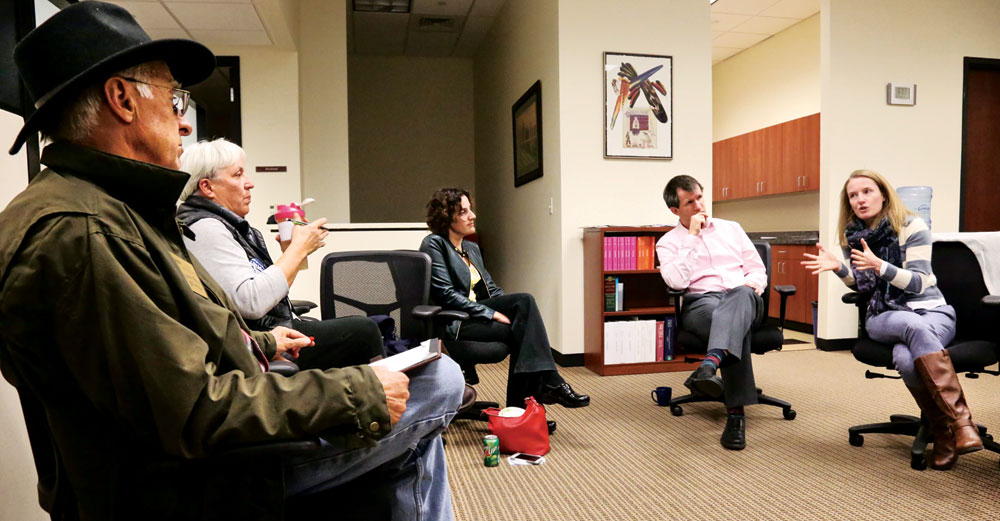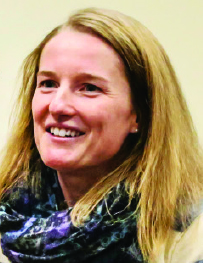
At a meeting in Stapleton, research scientist Trish Zornio (right) took questions from attendees about her positions. Zornio is exploring a 2020 run for a seat in the U.S. Senate.
Scientists and supporters around the country and in Colorado are gearing up for a second March for Science on April 14, following the event last year that drew 20,000 participants to Civic Center Park. The theme for this year’s Colorado event is “Making the imaginary positively real,” and it is pinned to four ideas: investing in science; including diverse voices; celebrating innovation; and inspiring people to explore science.
The March has a decided political aim. Many of its organizers are concerned that politicians at all levels are ignoring scientific evidence and undervaluing scientific research in crafting policy.
Colorado’s March for Science President Lis Cohen is a Stapleton resident and a climate scientist. She became involved with the March last year because “I was really worried about what was going on in politics,” said Cohen. “It was frustrating for me to not feel like the leaders of our country understood and were willing to do something about climate change.”

Trish Zornio
Stapleton resident and March for Science organizer, Kevin Hennegan likewise feels concern when he hears legislators like Rand Paul propose cutting back on what Paul deems “silly science,” due to a lack of understanding of the implications of basic scientific research. “Anytime a legislator who doesn’t have a background in science starts talking about science policy, it gets really bad, really fast,” said Hennegan.
That’s why Cohen, Hennegan and others are working to get more scientists involved in politics. The March for Science group organized a community meeting last fall with Trish Zornio, a scientist who is exploring a bid for Cory Gardner’s U.S. senate seat in 2020.
Last Fall, Zornio met with March for Science members at Hennegan’s Stapleton offices. A New Hampshire native, Zornio is from a rural and conservative background and is the first in her family to achieve an advanced degree. Her graduate work in neuropsychology and neuropharmacology led her into mental health and rare disease research, and time spent between laboratory and clinic gave her experience in the impact of policies on healthcare.
“Given the massive backlash… towards science…from cutting funding to straight-out denial of the studies that have been going on for decades, whether it be climate change or vaccines or whatever it might be,” said Zornio. ”Getting people in office who are able not only to understand that science but break it down for the general public so it’s not quite so overwhelming and scary—that’s something I’ve become very passionate about.”
To learn more about Zornio see zornioeyes2020.com. And to get involved with the March for Science go to marchforsciencedenver.org.
March for Science
April 14, 2018
Civic Center Park



Yes, I am aware of Sen. Paul’s professional background. The pairing of my specific comment on Paul’s proposed legislation with my more general comment about the perils of legislators without scientific backgrounds developing science policy creates an unintended impression. (My fault, not the reporter’s)
That said, the practice of medicine and the conduct of scientific research are distinctly separate skill sets. In my profession, I have met many physicians who excel at each, but only a few who excel at both. Senator Paul’s willingness, even eagerness, to insert political appointees into what should be objective reviews on the merits of scientific inquiries suggests to me that, whatever his skills in his former profession, he is now more interested in scoring partisan points than encouraging robustly designed studies.
As for the inclusion of diverse voices in the March for Science, I submit that Mr. Conaway is extrapolating too much from a single data point. Just within the Denver chapter, the March has over 100 volunteers and has over 9000 members in our Facebook group. I do not and cannot pretend to speak for all of them. I invite Mr. Conaway and the rest of the community to come to the march on April 14, listen to our speakers, visit some of the many organizations hosting tables at the event, and then judge for yourselves whether the organization has met its diversity goals.
Posted by the Front Porch at the request of a reader who submitted the comment by email:
Just read March for Science organizer Kevin Hennegan’s remarks about Rand Paul. Does he think a person gets to be a physician without “a background in science”, and has no “understanding of the implications of basic scientific research? Now I am no backer of Rand Paul, but i wonder if Hennegan even knows Paul is a ophthalmologist. Just because he does not agree with Paul he immediately discredits him.
So much for one of the organization’s four ideas: “including diverse voices”.
Hank Conaway